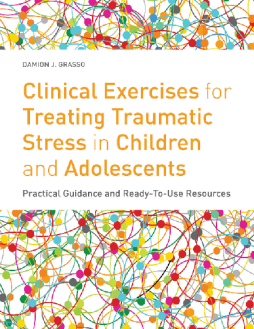
BOOK
Clinical Exercises for Treating Traumatic Stress in Children and Adolescents
(2014)
Additional Information
Book Details
Abstract
How do I implement effective strategies for treating traumatic stress in this particular child or adolescent?
Clinical Exercises for Treating Traumatic Stress in Children and Adolescents combines guidance for personalizing and implementing effective treatment approaches with practical materials to use in session. It describes the potential impact of trauma on children and adolescents, outlines core principles of effective treatment models, and provides practical guidance for tailoring treatment strategies to the specific needs of the individual. The featured worksheets and practical resources are designed to be compatible with evidence-based treatment models including Trauma-Focused Cognitive Behavioral Therapy (TF-CBT), Prolonged Exposure, Attachment, Self-Regulation and Competence (ARC), and Child-Parent Psychotherapy (CPP).
Replete with adaptable, ready-made materials, this convenient resource will help any clinician working with trauma exposed 8-18-year-olds to implement effective treatment strategies in practice, as well as to take a tailored approach that engages them with creative, therapeutic activities.
This Workbook is a unique and invaluable resource for clinicians and clinical trainees who treat traumatized children. It will be required reading for every therapist and trainee whom I supervise in the UConn Child Trauma Clinic, and should be required reading in every children's mental health clinic and every graduate training program preparing mental health, social work, and counseling professionals to work therapeutically with children and teens.
Julian D. Ford, PhD, Professor of Psychiatry, Graduate School Faculty, University of Connecticut Health Center, USA
This book provides outstanding practical guidance and exercises to augment clinical work using evidence-based models of therapy for traumatized children and adolescents. It is vital addition to the libraries of practicing clinicians, and the book will be of great benefit to trainees. I recommend it highly.
Joan Kaufman, PhD, Associate Professor of Psychiatry, Director of the Child and Adolescent Research and Education (CARE) Program, and Director of the Child Welfare Unit, Zigler Center for Child Development and Social Policy, Yale University, USA
Damion Grasso has developed a resource which will be helpful for developing and experienced clinicians. This is a highly flexible resource which provides a range of tools for working with traumatized children, adolescents and their families, and which can be drawn upon and incorporated into the intervention that the clinician is using. I liked the breadth of this work, with ideas for all stages of the therapeutic journey with the children and their carers. This resource is visual, creative and attractively set out. A good book to have on the shelf when fresh ideas are needed.
Kim S. Golding, Clinical Psychologist, UK
Dr. Damion Grasso has created an extraordinarily valuable resource for all therapists working with children, adolescents and families in the aftermath of traumatic experiences. The clinical ideas, therapeutic exercises and helpful forms provided in this text reflect Dr. Grasso's exceptional creativity, clinical sensitivity and dedication to supporting the effective implementation of evidence-based treatments with this vulnerable population of children.
Esther Deblinger, PhD, Co-Director of the Child Abuse Research Education and Service (CARES) Institute, Professor of Psychiatry, Rowan University, New Jersey, USA
Damion J. Grasso, PhD., is an Assistant Professor of Psychiatry and Pediatrics at the University of Connecticut School of Medicine, USA. He has worked extensively in the area of early trauma exposure and child development, with research focusing on the assessment and treatment of trauma-related problems in children and adolescents.
